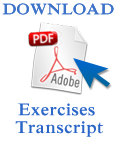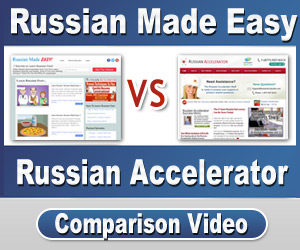Who and What in Russian
Listen To Entire Episode
Exercises Only
Welcome to Podcast #5. Before doing our review, let’s add one new occupation which is kind of a cognate. Listen and repeat:
адвокат
[NOTE: I’ve chosen to not sound out the Russian words in these transcripts using English letters. If you’d like to be able to read Russian (it can be learned in just a few days) I’ll include a link at the bottom of this transcript to my course on reading Russian.]
One more time: адвокат
So what kind of occupation is an адвокат? Well, when the police arrest a suspect in the U.S., they must inform him that he has the right to remain silent, and that he has the right to hire an адвокат.
To put it another way: The person you hire to represent you in court is called your адвокат.
So адвокат is the Russian word for lawyer. It sounds like advocate, which is what a lawyer is, right? He’s an advocate for your rights and your side of the story. Just note how the emphasis is on the end of the word. адвоКАТ.
Say: My Dad is a lawyer.
Мой папа – адвокат.
Alright, now let’s do some review.
What Russian word do we use to greet people?
Здравствуйте!
Say: My name is George.
Меня зовут Джордж.
Ask someone:
And what’s your name?
А как Вас зовут?
Say: This is my dad. He’s a lawyer.
Это мой папа. Он – адвокат.
Try saying: My dad is an American, whereas my mom is an Englishwoman.
Мой папа – американец, а моя мама – англичанка.
This is my friend. He’s an Australian.
Это мой друг. Он – австралиец.
This is my female friend. She is an American.
Это моя подруга. Она – американка.
Alright, in this podcast we’ll be learning two question words. Here’s the first one. Repeat after the speaker:
Кто
One more time:
Кто
Imagine I’m showing my Russian friend Natasha some photos of my friends and family on Facebook. Can you get the meaning of КТО from our short conversation? I point to a family photo and say…
Это Я.
А кто это?
Это моя мама.
I then show her the next photo of me and some friends. Natasha asks…
Это твой друг Джэйсон, да?
Да, это Джэйсон.
Ммм-хмм. А кто это? (NOTE: That’s not a typo. т is the script version of the letter T in Cyrillic)
Это моя подруга Нэнси.
What is she asking when she says, “А кто это?” She’s asking, “And who is this?”
So, KTO is one of the Russian words for “who”? The word is spelled with just three letters: A “K” a “T” and an “O”.
So ask someone: Who is this?
Кто это?
As we did in the last podcast, I want to show you how that little word “ah” works in Russian.
Imagine my friend is looking at my photos in Facebook. He points to someone and asks…
(Vlad) Кто это? Твой друг Стив, да?
(Yuri) Да. Это Стив.
(Vlad) (pointing to a girl) А кто это?
See how he used “ah” to set up a contrasting question? The actual literal meaning of “a” in this context is along the lines of: Having processed what you just said, I’d now like to ask the following:
I don’t mean to make a big deal out of such a little word, but you’ll hear it all the time, so I just want you to really grasp it. So ask your friend:
Who is this? Your mom, yes?
Кто это? Твоя мама, да?
She answers that yes, it’s her mom. So now follow that up by asking:
And who is this? Your dad?
А кто это? Твой папа?
Did you add the “ah” sound at the beginning?
This is a good point to talk about word order, which is quite a bit more flexible in Russian than in English. For example, we might have phrased that last question this way:
А это кто?
And this is who?
By putting the question word last, we’re placing more importance on it. Again, word order is one of those things I’ll be pointing out as we go.
Now let’s try our other question word for this episode. Repeat after the speaker:
Что?
And again…
Что?
So for this one, imagine you’re at a Russian friend’s house for dinner. Now, you know darn well that the soup you’ve just been served is borscht, but you want to practice asking questions, so you point to the soup and ask your friend Tanya…
Таня, что это?
Это борщ.
Then Uncle Tolik pours a clear liquid into your shotglass. Ask him..
Эй, Толик…что это?
Это водка.
So, ЧТО is one of the Russian words for “what”? Now you ask…
What is this?
Что это?
She tells you it’s borscht, and then — pointing to the dish of red fish eggs that she just gave you — follow up with…
And what’s this?
А что это?
Did you add the “ah” at the beginning?
[NOTE: You could have reversed the word order and said…А это что? And this is what? ]
Anyway she points to the red fish eggs and tells you…
Это икра.
So, ИКРА is the Russian word for caviar.
And that’s why our question phrase is so useful because we can use it to learn lots of new words, kind’ve “on location.” So, let’s repeat the word for caviar one more time:
икра
V.O. And now, here’s your Tip of the Day from Russian Made Easy…
Now here’s a cool way to remember the word. Imagine you don’t like caviar, and yet someone just served you some. You kinda freak out and say…”EEK, raw fish eggs!”
Say that again: Eek, raw fish eggs!
Do you get it? That phrase has the sound of ИКРА hidden in it. eek raw…gives us икра
I call that kind of mnemonic device a PowerPhrase and they’re a great tool for quickly memorizing a ton of words. When I was first learning Russian I made a PowerPhrase for just about every new word I learned. It’s amazing how much you can remember that way. And I use those same ones in our Russian Accelerator videos, along with funny pictures to really drive home each phrase. The visual part is really important, and it’s a limitation of an audio-only format. Because you really want to associate an image with each PowerPhrase….that helps to make it memorable. These kinds of mnemonic devices are used by all memory experts and advanced language students. Ask anyone who’s learned a 2nd or 3rd language quickly, and they’ll admit they used these kinds of memorable phrases to help them recall words.
Alright, let’s get back to our lesson today. So…pretend your Russian friend is showing you a picture of himself sitting in a restaurant across from two men wearing suits. Point to the older man in the picture and ask…
Who is that?
Кто это?
How will your friend reply:
This is my lawyer.
Это мой адвокат.
Then point to the other man and ask…
And who is this?
А кто это?
He answers:
This is my friend Pavel. He is a businessman.
Это мой друг Павел. Он – бизнесмен.
Then point to the bottle of alcohol in the photo and ask…
What’s this?
Что это?
Listen to his answer:
Это виски.
And so, with that “что это?” question, we learned another easy word. We say “whiskey” and Russian it’s “veesky”, with a “v” sound. Listen…
виски
Just one last new word to cover today, and you probably already know it. But I just need to make sure. Try saying:
нет
That beginning sound is like from the middle of the word “onion.” That transition. Onion…NYET…
If you know the meaning of this word say, ДА …I know it.
If you don’t, then say НЕТ I don’t know it.
So, Да and НЕТ are opposites.
Да means YES and НЕТ means No.
Let’s work with it a little bit. Imagine showing a picture of your friend Kevin to your Russian girlfriend. She asks:
Это Джон?
Tell her: No, this is Kevin.
Нет. Это Кэвин.
She asks: Is he a businessman?
Он – бизнесмен?
Tell her: No, he’s an engineer.
Нет. Он – инженер.
Not that you could ever mistake one for the other, but point to the filled shotglass in front of you and ask…
What is this? Vodka
Что это? Водка?
How will the person tell you:
No. This is whiskey.
Нет. Это виски.
So, practice asking these questions as you go about your day.
In the next episode we’ll learn how to order food and drinks….certainly a useful thing to know…and we’ll learn how to develop fluency in Russian. Yes, even beginners should be working towards fluency right from the start. And I’ll show you how, in the next episode. Meanwhile, head over to RussianMadeEasy.com for today’s downloads.
DOWNLOADS – (right click with mouse and “save as”)


Please comment or share with one of the buttons below. Your support helps keep the ball rolling!





Leave a Reply